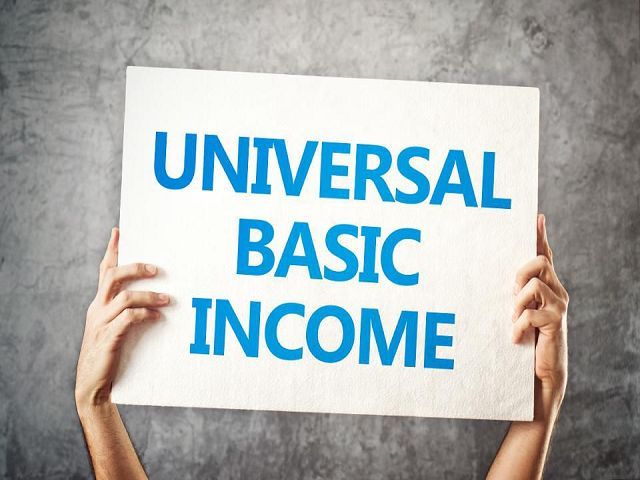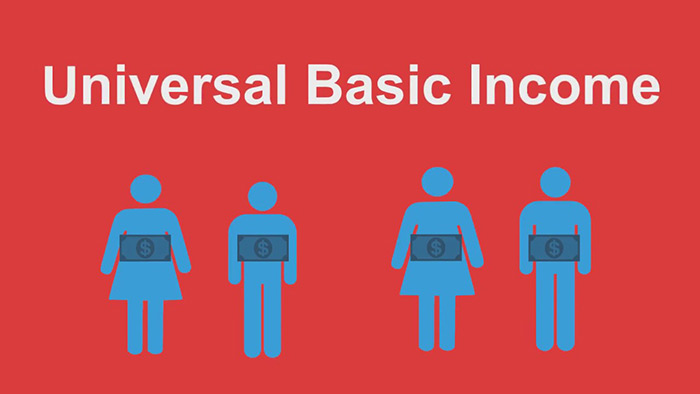
COVID-19 has caused unprecedented disruptions globally and inflicted the greatest pain on those who had already been rendered most vulnerable, spurring unknown hardship and growing unease among low-income families and micro-businesses. It has uncovered existing inequities and created new ones. A Universal Basic Income (UBI) has been strongly advocated by economists, industry captains and policy-makers across all ideological hues. It is perhaps the only way to stave off large-scale hunger, destitution and social unrest in troubled times. Human development theorist Denis Goulet argues that the concept of development is best expressed in the phrase, “the human ascent” and in the ascent of all men in their quintessence of humanity, including the economic, biological, psychological, social, cultural spiritual and transcendental dimension.
The idea of a UBI has made recurrent appearances in history — starting with Thomas Paine in the 18 century. It is premised on the idea that the Government would pay a flat fee to every adult citizen, regardless of his/her engagement in skill-building activities or the paid labour market, as a partial or complete substitute for existing social security and welfare programmes. UBI is gaining traction as governments look to revamp their social safety nets. India is the most serious new aspirant.
In a UBI system, the Government gives citizens a regular infusion of free cash with no strings attached. These efforts intend to provide a lifeboat to help low-income families and micro-businesses survive any crisis, like the current pandemic and importantly, to continue to cope with daily emergencies as normal economic life stutters through the slowdown.
India makes a compelling case for UBI as it already invests heavily in social protection programmes but the outcomes leave much to be desired. It spends about two per cent of its GDP on core social protection and welfare schemes. This translates into an investment of Rs 9 lakh crore in more than 10,000 schemes. The annual budgets for some of India’s key flagship welfare schemes amount to Rs 3,79,100 crore per year. These include MGNREGS, PM Kisan, the National Social Assistance Programme, and so on. Despite the humongous scale and noble intent of these welfare schemes, accessing them remains a challenge for beneficiaries as their coverage varies widely in enrolment and delivery.
A survey conducted by Dalberg in April, covering Below Poverty Line (BPL) families across 10 States, revealed that coverage is not universal. The gaps varied according to the scheme: Public Distribution System (PDS) was 15 per cent, Jan Dhan 43 per cent, Social Pension 56 per cent and PM Kisan was 66 per cent. The delivery of benefits is low and the percentage of eligible households that received their PDS entitlements was 55 per cent, Social Pension 34 per cent, PM Kisan 30 per cent and Jan Dhan was 28 per cent. These gaps are largely on account of eligibility challenges, lack of awareness among beneficiaries and onerous administrative procedures.
A basic income, coupled with some imaginative implementation, can help surmount these challenges. It can have a deeper impact on the various development programmes. Non-eligibility for the Atma Nirbhar package on account of absence of Jan Dhan accounts spurred people to actively increase enrolment in the scheme and 3.05 crore new accounts were added in the period following the imposition of the lockdown, increasing the base by roughly 10 per cent.
Securing food, health and basic income can strengthen initiatives directed at water and food security, healthcare, nutrition and sanitation. UBI can help connect beneficiaries to a wider portfolio of entitlements and catalyse a deeper and more sustained impact on their lives. In addition to complementing existing programmes, social protection, too, makes a compelling case for returns on philanthropic capital.
UBI is a broad, non-targeted periodic cash payment, unconditionally delivered to all, rich or poor, on an individual basis. The idea is to ensure that every person in society has the means to live with a modicum of freedom and dignity, independent of one’s capacity to earn or the availability of employment. Cash transfers are not tied to the recipients’ behaviour, and they are free to spend the money as they wish. In contrast, an example of a conditional, in-kind transfer in India would be the Mid-Day Meal Scheme (MDMS), where the meal, an in-kind transfer, is conditional upon attending school.
A UBI guarantees that people will not be impoverished, will not go hungry, and will be protected from job loss due to automation while cutting the need for many other forms of social security. A basic monthly income can also replace a string of welfare subsidies for the poor that India currently has in place. Getting a guaranteed, regular infusion of cash can certainly make people happier and less stressed (even if that cash isn’t enough to cover all their needs). Yet most countries aren’t doing it.
While exploring the ideological foundations of neo-liberalism in lectures at the Collège de France in 1978-79, the philosopher, Michel Foucault, argued that neo-liberal logic regards the economy as a game in which the State makes the rules and guarantees their application. A guaranteed income “should make it impossible for one of the participants in the economic game to lose all he has and so be unable to continue playing.” Nobody should have anything to lose; the State establishes a safety net for everyone. The UBI system is based on the need to help those who are poor, without enquiring whose fault it is that they are poor and differs from traditional social policies in that it makes no distinction between the “deserving” and “undeserving” poor.
Foucault believed , “we take no interest, and it is quite proper that we should take no interest, in why people have fallen below the level at which they can take part in the social game — we don’t care whether they are drug addicts, or voluntarily unemployed.” The state is content, “without looking any farther, and therefore without the need for investigations by civil service (national insurance officers), police and judiciary, to pay them a subsidy, under rules which encourage them to rise above the threshold once more. But it doesn’t matter at all if they don’t want to: they will still receive the subsidy.” This is the essence.
The basic objective of UBI is to reduce inequalities on account of distribution of wealth and other assets. Disparity of income arises from inequalities in human capital (levels of literacy, skills health and so on), inequalities in opportunities (in education, jobs and so on), and disparity in living conditions.
The four main goals of UBI are security and social protection (for the young, old, disabled and women); development and economic growth to give poor people the security they need to invest in higher risk/return options (like new crops, or upgrading their livelihoods); breaking inter-generational poverty (though better nourishment and education for children) and rights and equity (narrowing income inequality and promoting the status of girls and women). Unconditional cash transfers to citizens are considered one of the fairest, most cost-effective and impactful ways to alleviate poverty and stimulate economic growth.
Instead of relying on an expensive and complex aid industry and by bypassing NGOs and governments, cash transfers given directly to poor families will enable them to decide on the most effective ways for them to escape poverty.
UBI can significantly reduce losses to corrupt intermediaries and the digital payment mode leaves no scope for middlemen to sponge funds. But it may not simply overhaul the sometimes corrupt decision-making process that determines who is eligible for benefits in the first place.
The late French philosopher, Charles Pguy, in his classic essay on poverty, says, “The duty of tearing the destitute from their destitution and the duty of distributing goods equitably are not of the same order. The first is an urgent duty; the second is a duty of convenience. When all men are provided with the necessities, what do we care about the distribution of luxury?” Envy should not be the motive for equalisation of wealth. We need to have a more nuanced understanding of the issue.
There are however some downsides of UBI: recipients might misuse the money they receive; it will induce people to work less or create a disincentive to work. In the words of Thomas Piketty, the renowned French economist “the cost of substantial fiscal redistribution would be considerable, because it would decrease the return on investments (for individuals) in human capital and thus decrease the incentives for individuals to make such investments …”
Since most of our farmers have small pieces of land, they are unemployed. Unless they get an average of 48 hrs work per week, it will be almost impossible to pull them out of poverty. Poverty is not essentially a result of lack of opportunities. We know of innumerable complaints by farmers that getting labourers to work on farms is becoming difficult these days. So, while on the one hand work is available, not enough takers are there. It is true that wages have to be commensurate with work, but it is a fact that in many cases unions are demanding more wages for less work and distorting labour dynamics.
While it is the duty of the government and the well placed people to take care of welfare of the underprivileged, giving them fish is a short term measure. Enabling them to fish for themselves is a long term, more important measure. This part revolves around education, attitude building, one wonders why massive projects on the lines of ‘rally for rivers’ are not being taken up. The money spent on such projects will provide large scale employment, create wealth, and improve ecological balance.
In case of a viable and essential UBI, two areas remain highly contentious: targeting and making this income subject to specific conditions. Should recipients be asked to satisfy conditions such as sending their children to school or doing voluntary labor?’ There is often a conflict between the technocrats’ urge for tight targeting to ‘maximise efficiency’ and public rejection in favour of universality. Targeting appears particularly divisive there is only a small gap between poor and non-poor in many low income countries.
The great American President Franklin D. Roosevelt gave us a wonderful mantra way back in 1937. It is more relevant today than ever before: “The test of our progress is not whether we add more to the abundance of those who have too much; it is whether we provide enough for those who have too little.”
Moin Qazi is the author of the bestselling book, Village Diary of a Heretic Banker .He has worked in the development finance sector for almost four decades .He can be reached at [email protected]
SIGN UP FOR COUNTERCURRENTS DAILY NEWSLETTER












































